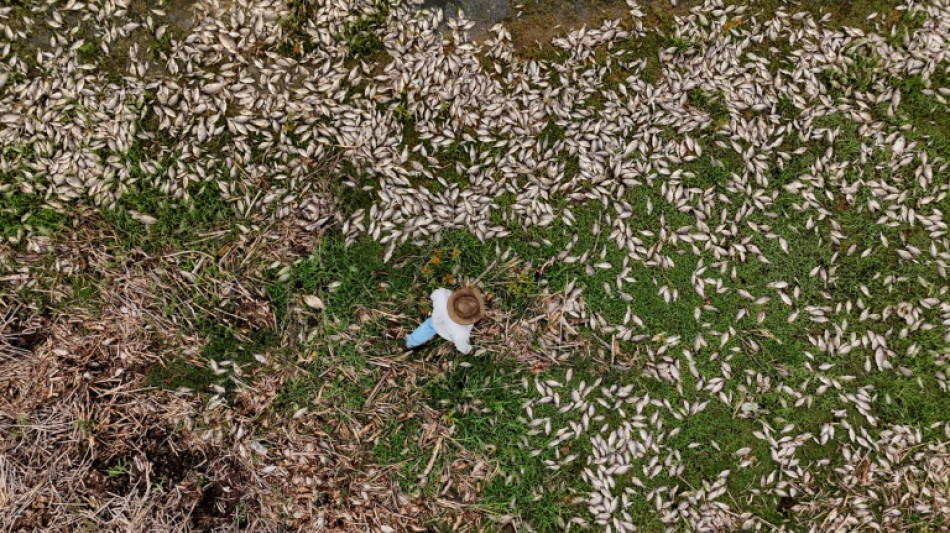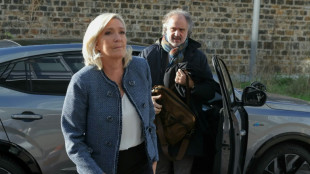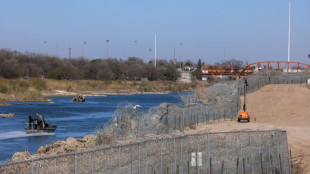
-
 Mbappe can be Real Madrid 'legend' like Ronaldo: Ancelotti
Mbappe can be Real Madrid 'legend' like Ronaldo: Ancelotti
-
Saka 'ready to go' for Arsenal after long injury lay-off: Arteta

-
 Aston Martin to sell stake in Formula One team
Aston Martin to sell stake in Formula One team
-
Three talking points ahead of clay-court season

-
 French court hands Le Pen five-year election ban
French court hands Le Pen five-year election ban
-
Probe accuses ex J-pop star Nakai of sexual assault

-
 Japan leads hefty global stock market losses on tariff woes
Japan leads hefty global stock market losses on tariff woes
-
Saka 'ready to go' after long injury lay-off: Arteta

-
 Ingebrigtsen Sr, on trial for abusing Olympic champion, says he was 'overly protective'
Ingebrigtsen Sr, on trial for abusing Olympic champion, says he was 'overly protective'
-
Tourists and locals enjoy 'ephemeral' Tokyo cherry blossoms

-
 Khamenei warns of 'strong' response if Iran attacked
Khamenei warns of 'strong' response if Iran attacked
-
France fines Apple 150 million euros over privacy feature

-
 UK PM urges nations to smash migrant smuggling gangs 'once and for all'
UK PM urges nations to smash migrant smuggling gangs 'once and for all'
-
Thai authorities probe collapse at quake-hit construction site

-
 France's Le Pen convicted in fake jobs trial
France's Le Pen convicted in fake jobs trial
-
Chinese tech giant Huawei says profits fell 28% last year

-
 Trump says confident of TikTok deal before deadline
Trump says confident of TikTok deal before deadline
-
Myanmar declares week of mourning as hopes fade for quake survivors

-
 Japan's Nikkei leads hefty market losses, gold hits record
Japan's Nikkei leads hefty market losses, gold hits record
-
Tears in Taiwan for relatives hit by Myanmar quake

-
 Venezuela says US revoked transnational oil, gas company licenses
Venezuela says US revoked transnational oil, gas company licenses
-
'Devastated': Relatives await news from Bangkok building collapse

-
 Arsenal, Tottenham to play pre-season North London derby in Hong Kong
Arsenal, Tottenham to play pre-season North London derby in Hong Kong
-
Japan's Nikkei leads hefty equity market losses; gold hits record

-
 Israel's Netanyahu picks new security chief, defying legal challenge
Israel's Netanyahu picks new security chief, defying legal challenge
-
Trump says US tariffs to hit 'all countries'

-
 Prayers and tears for Eid in quake-hit Mandalay
Prayers and tears for Eid in quake-hit Mandalay
-
After flops, movie industry targets fresh start at CinemaCon

-
 Tsunoda targets podium finish in Japan after 'unreal' Red Bull move
Tsunoda targets podium finish in Japan after 'unreal' Red Bull move
-
French chefs await new Michelin guide

-
 UK imposes travel permit on Europeans from Wednesday
UK imposes travel permit on Europeans from Wednesday
-
At his academy, Romanian legend Hagi shapes future champions

-
 Referee's lunch break saved Miami winner Mensik from early exit
Referee's lunch break saved Miami winner Mensik from early exit
-
Djokovic refuses to discuss eye ailment after shock Miami loss

-
 Mitchell magic as Cavs bag 60th win, Pistons and T'Wolves brawl
Mitchell magic as Cavs bag 60th win, Pistons and T'Wolves brawl
-
Mensik shocks Djokovic to win Miami Open

-
 Duterte lawyer: 'compelling' grounds to throw case out
Duterte lawyer: 'compelling' grounds to throw case out
-
What happens on Trump's 'Liberation Day' and beyond?

-
 Clock ticks on Trump's reciprocal tariffs as countries seek reprieve
Clock ticks on Trump's reciprocal tariffs as countries seek reprieve
-
Japan-Australia flagship hydrogen project stumbles

-
 Musk deploys wealth in bid to swing Wisconsin court vote
Musk deploys wealth in bid to swing Wisconsin court vote
-
Mensik upsets Djokovic to win Miami Open

-
 China manufacturing activity grows at highest rate in a year
China manufacturing activity grows at highest rate in a year
-
'Waited for death': Ex-detainees recount horrors of Sudan's RSF prisons

-
 Japan's Nikkei leads big losses in Asian markets as gold hits record
Japan's Nikkei leads big losses in Asian markets as gold hits record
-
Rescue hopes fading three days after deadly Myanmar quake

-
 'Basketbrawl' as seven ejected in Pistons-Wolves clash
'Basketbrawl' as seven ejected in Pistons-Wolves clash
-
Four men loom large in Microsoft history

-
 Computer pioneer Microsoft turns 50 in the age of AI
Computer pioneer Microsoft turns 50 in the age of AI
-
Trump calls out both Putin and Zelensky over ceasefire talks


UN nature talks 'close' to breaking funding deadlock
Nations were locked in last-ditch efforts to break deadlock on funding for nature at UN talks in Rome Thursday, in what several countries framed as a test for international cooperation in the face of geopolitical tensions.
Rich and developing countries broadly agree over the scale of the crisis that threatens the ecosystems and wildlife that humans rely on for food, climate regulation and economic prosperity.
But their disagreements over how to govern the billions of dollars needed to protect species caused a previous meeting in Cali, Colombia last year to end in disarray.
The rebooted COP16 talks are tasked with bridging those differences.
There were signs that countries were pulling closer together in the early evening Thursday, after intense closed door talks based on a "compromise attempt" text that Brazil put forward on behalf of the BRICS country bloc that includes Russia, China and India.
"I think that we have made great progress and are quite close to, you know, agreeing on this document," said the European Union negotiator Hugo Schally at an evening plenary.
COP16 president Susana Muhamad of Colombia presented what she called a "well advanced" document Thursday evening, with just one paragraph in brackets, showing that it is still unresolved.
It will be put to negotiators later in the evening.
The talks come as countries face a range of challenges, from trade disputes and debt worries to the slashing of overseas aid by new US President Donald Trump
Washington, which has not signed up to the UN's Convention on Biological Diversity, sent no representatives to the meeting.
Brazil's negotiator Maria Angelica Ikeda told AFP that financing has been a flashpoint long before the current international tensions, adding that the BRICS proposal sought to be "very sensitive" to a broad spectrum of views.
"So instead of fighting each other, what we need is to prove that yes, we can adopt a multilateral decision that will clearly set a path forward," she said.
"If we don't unite here, we run the risk of losing everything back home as well. So that's what's at stake in this COP."
- 'Test case' -
A European Union official, who asked to remain anonymous because they were not authorised to speak publicly said countries were reeling from economic constraints and a "fundamentally changed landscape geopolitically".
"Everybody knows what's at stake, it's multilateralism that is at stake. It's a test case here," they told AFP.
And scientists have warned that action is urgent.
A million species are threatened with extinction, while unsustainable farming and consumption destroys forests, depletes soils and spreads plastic pollution to even the most remote areas of the planet.
Young protesters greeted negotiators as they arrived at the building of the UN Food and Agriculture Organization on Thursday, playing a soundtrack of rainforest noises and handing out flyers urging: "Don't let silence be our legacy".
- Money worries -
The BRICS proposal sought to clarify two main goals to be agreed -- closing the multi-billion-dollar biodiversity financing gap and deciding on the institutions that will deliver that money.
That is a key next step after a landmark 2022 agreement that saw countries agree to halt the destruction of nature by the end of this decade.
They laid out a programme of objectives to be achieved by 2030, including protecting 30 percent of the world's land and seas.
Countries have already agreed to deliver $200 billion a year in finance for nature by 2030, including $30 billion a year from wealthier countries to poorer ones.
The total for 2022 was about $15 billion, according to the OECD.
The main debate is over developing countries' demand for the creation of a specific biodiversity fund, which has seen pushback from the EU and other wealthy nations, who have argued against multiple funds.
The failure to finalise agreement in Cali was the first in a string of disappointing outcomes for the planet at UN summits last year and comes as trade disputes and conflicts rattle global cooperation.
A climate finance deal at COP29 in Azerbaijan in November was slammed as disappointing, while separate negotiations about desertification and plastic pollution stalled in December.
Th.Berger--AMWN



